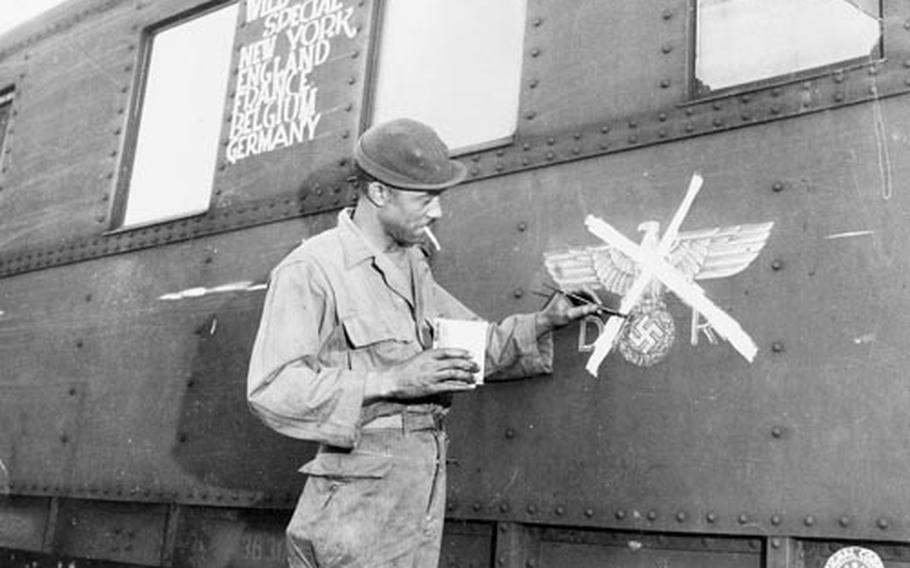
Army Pvt. 1st Class Eugene Davis of the 375th Engineer Battalion paints over a swastika on a train car in Pallenberg, Germany. The image is part of a gallery of photos for an ongoing research project by historians Maria Höhn and Martin Klimke documenting the stories of black servicemembers in postwar Germany and how those experiences helped shaped the civil rights movement in the U.S. and abroad. The researchers are looking for more black veterans who served in postwar Germany to share their stories. (Courtesy of National Archives)
Contact the researchers and share your story
In the words of retired Gen. Colin Powell, postwar Germany was "a breath of freedom" for black soldiers, especially those out of the South: "[They could] go where they wanted, eat where they wanted, and date, whom they wanted, just like other people."
Germany, on the heels of a Holocaust flamed by anti-Semitism, would seem to be the last place on earth to experience any wisp of racial freedom.
But two historians studying the experience of black American GIs in postwar Germany maintain that racial discrimination was not institutionalized as it was in the southern United States at the time. So, interracial interactions were possible, if not always popular.
"When they got out of the South, it was their first experience of a society without racial boundaries," said Maria Höhn, who teaches German history at Vassar College and wrote "GIs and Fräuleins: The German-American Encounter in 1950s West Germany," published in 2002.
Höhn and her colleague Martin Klimke are collecting the oral histories of black veterans who served in postwar Germany and are looking for more to interview for a research project that, even in its infancy, has been honored by the National Association for the Advancement of Colored People.
Höhn and Klimke have about 50 interviews lined up with black veterans, but want to talk with at least 100.
"Our major concern is to get these stories on the record, not only for history but also for the families," said Klimke, a research fellow at the Heidelberg Center for American Studies at the University of Heidelberg in Germany. Younger generations have "no idea their grandparents or parents spent so much time in Germany and witnessed these things."
Titled "The Civil Rights Struggle, African-American GIs and Germany," the project explores the connection between the establishment of American military bases abroad and the advancement of civil rights in the U.S., and the role that black GIs played in carrying the demands of the civil rights movement abroad beginning with World War II.
Höhn and Klimke are initially focusing on Germany, which has been home to the largest contingent of American troops deployed outside the United States for the past 60 years. Between 1945 and the end of the Cold War in 1989, about 2 million to 3 million black military personnel, family members and civilian employees lived in Germany.
For many black servicemembers, the irony of fighting Nazism and promoting democracy abroad while being subjected to the racist fist of Jim Crow changed their perspective and fueled a purpose, the researchers say, sparking their involvement in the civil rights struggle after they returned to the United States.
"As a consequence of their experiences, but also the opportunities offered by military life, GIs were empowered," Höhn said.
"The goal is to build a large oral history collection that will keep on growing in the future with the help of the military community and the people who interacted with them," Klimke said.
They’re searching for black servicemembers who served in Germany from 1945 until the end of the Cold War to share "any kind of stories or reflections … on their time in Germany or on how their military service changed their perspective on civil rights in the United States," Klimke said.
Those stories, as well as photographs and documents from the era, are part of an exhibit that’s traveling around Germany and the United States this year and next. There is discussion of bringing the exhibition to military bases throughout Europe next summer, Klimke said.
The project, supported by the German Historical Institute in Washington, D.C., Vassar College in Poughkeepsie, N.Y., and the Heidelberg Center for American Studies, is also being made into a digital archive available online at: http://aacvr-germany.org. The site provides contact information for black veterans interested in speaking with the researchers.
Höhn and Klimke hope that by giving voice to the experiences of black servicemembers in postwar Germany, they’ll expand the story of the civil rights movement beyond the boundaries of the United States.
So far, those voices have told powerful, poignant stories.
Says Leon Bass, who as a 19-year-old black sergeant was among American soldiers who liberated Buchenwald, a Nazi concentration camp, in April 1945:
"There were so many different groups placed in that camp by the Nazis. And what did the Nazis use as a yardstick as to who would be chosen to go there? They said those people who were not good enough, those people who were inferior, they could be segregated. So, you see what I mean? Segregation, racism, can lead to the ultimate, to what I saw at Buchenwald."
Bass’ story is found among 15 interview transcripts posted so far on the Web site.
"The veterans are very enthusiastic about the project and that someone is taking on their story, which has sort of fallen through the cracks on both sides of the Atlantic," Klimke said.